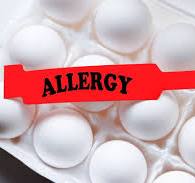Egg Allergy: Symptoms, Causes, and Treatment
Egg allergy emerges when the body’s defense system launches an erroneous attack against proteins found in eggs, mistaking them for harmful invaders. This immune misfire is primarily orchestrated by antibodies known as immunoglobulin E (IgE), which set off a cascade of chemicals like histamine, culminating in the telltale signs of an allergic reaction.

The usual suspects in egg allergy are proteins called ovalbumin and ovomucoid present in egg whites. Yet, some individuals might react to egg yolk proteins, including livetin and apovitellenin. This sensitivity can extend to both egg components, various preparation methods, and even different bird eggs, such as those from chickens, ducks, or quails.
While the root cause of egg allergy remains elusive, it’s thought to be a mix of inherited traits and environmental triggers. Risk factors include:
- Family Ties: A family history of egg allergy or other food allergies can heighten one’s risk.
- Youthful Tendencies: Typically surfacing in infancy, egg allergy is more prevalent among children, with many outgrowing it by age 16. However, for some, it’s a lifelong companion.
- Allergic Company: The presence of other allergies, like asthma or eczema, can amplify the immune system’s overreactivity.
- Egg Encounters: The timing and regularity of egg exposure might sway the development of an allergy. Early introduction of eggs during infancy could lower the risk, while postponement beyond the first year might elevate it. The ideal window for egg exposure to prevent or provoke an allergy is still under investigation and likely varies individually.
Egg Allergy Symptoms
Detecting an egg allergy in its early stages is crucial for managing the condition effectively. The symptoms typically manifest within a few minutes to a few hours after consuming eggs or foods containing eggs. Here are some early signs to watch out for:
The Symptoms:
- Skin Reactions: Hives or eczema are common initial symptoms. Look for red, itchy welts or a rash1.
- Respiratory Issues: Nasal congestion, runny nose, sneezing, coughing, wheezing, or shortness of breath can occur12.
- Gastrointestinal Symptoms: Cramps, nausea, and vomiting are telltale signs of a possible egg allergy1.
- Swelling: Lip or eyelid swelling may be an early indication2.
- Sensory Symptoms: Itchy or watery eyes, itchy ears or throat can also be associated with an egg allergy2.
Anaphylaxis is a severe reaction that can develop and is a medical emergency. Symptoms of anaphylaxis include difficulty breathing, a sharp drop in blood pressure, dizziness, lightheadedness, or loss of consciousness1. If any of these symptoms occur, it’s vital to seek immediate medical attention.
If you suspect an egg allergy, it’s important to consult with a healthcare provider. They may recommend diagnostic tests such as skin prick tests, blood tests, or food challenges to confirm the allergy3. Remember, early detection and management are key to preventing serious allergic reactions. Always inform caregivers and teachers about the allergy and have an action plan in place for accidental exposures.
Egg Allergy Treatment
Egg Allergy Treatment
No definitive cure exists for egg allergy, but it can be managed and its dangers mitigated. The cornerstone of treatment is steering clear of eggs and egg-laden foods, coupled with vigilant label reading to uncover any concealed egg traces. Common culprits include:
- Baked Delights: Cakes, cookies, and pastries
- Morning Staples: Pancakes, waffles, and omelets
- Saucy Additions: Mayonnaise and dressings like Caesar or ranch
- Comfort Foods: Creamy soups and casseroles
- Pasta Pleasures: Egg noodles and cheesy dishes
- Protein Picks: Meatballs, burgers, and seafood patties
- Sweet Treats: Custards, puddings, and ice creams
Ingredients signaling egg content range from albumin and lecithin to terms prefixed with “ova” or “ovo.” Eggs can also sneak into non-food items like cosmetics, certain medications, and craft supplies.
For those with egg allergies, an epinephrine auto-injector should be a constant companion, ready for use in accidental exposures or severe reactions. Wearing medical identification and educating one’s circle on the allergy are crucial preventive steps.
A potential therapeutic avenue is oral immunotherapy (OIT), a gradual introduction of egg protein under medical oversight, aiming to desensitize the immune response. While not a panacea and not universally effective, OIT could lessen allergic severity for some, albeit with risks like anaphylaxis. Regular medical supervision is essential for those undergoing OIT.
In Summary
Egg allergy is an immune system overreaction to egg proteins, manifesting as symptoms from hives to anaphylaxis. More common in the young, its onset is influenced by genetic and environmental factors. Avoidance of eggs and readiness for emergencies with epinephrine are key management strategies. Oral immunotherapy offers a ray of hope for reducing immune sensitivity, but it’s not without its challenges. Consulting with healthcare professionals is vital for those navigating the complexities of egg allergy.
If you enjoyed this article, please like and share it with your friends, and don’t forget to subscribe for more great content!
Disclaimer: The contents of this article are intended to raise awareness about common health issues and should not be viewed as sound medical advice for your specific condition. You should always consult with a licensed medical practitioner before following any suggestions outlined in this article or adopting any treatment protocol based on the contents of this article.
Eggs 10 Amazing Benefits; Your Beauty Routine for Skin, Hair, and Health



